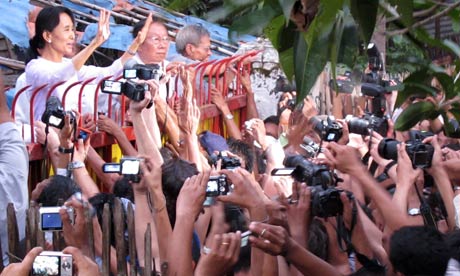is this not what we have been waiting for for so long?
"After 10 minutes, she appeared, in a lavender top, only her face and shoulders visible above the fence. The crowd roared. Here was the excitement, the enthusiasm of the Burmese people, so palpably missing from last week's election, embodied in a smiling 65-year-old woman, standing on a chair at her front gate, with flowers in her hair." from /burma-aung-san-suu-kyiMore: click HERE and also nonviolence videos HERE
beautiful picture HERE
Video, Pics and Slideshows HERE.
 |
| Aung San Suu Kyi Released at last. |
from guardian.co.uk World news Web
i show the entire article because things tend to disappear from archives.
Aung San Suu Kyi Crowds push past the barricades as Aung San Suu Kyi is freed
Children danced, monks meditated and after sustained applause
Aung San Suu Kyi spoke to supporters for the first time in years
Jack Davies in Rangoon guardian.co.uk, Saturday 13 November 2010 18.13 GMT
Burmese pro-democracy leader Aung San Suu Kyi greets supporters after being released from house arrest. Photograph: Mizzima News/EPA  |
| Aung San Suu Kyi Speaks to Crowd November 2010 |
In longyis and sandals, Aung San Suu Kyi's supporters ran the 400 yards to the front gate of her home. One woman, a portrait of "The Lady" pinned to her shirt, wept as she ran, calling out her name. They pushed against the ancient, sagging bamboo fence, singing and chanting, "long live Aung San Suu Kyi".
Despite years of house arrest, and the long hours yesterday waiting for the release order to finally come, inside her lakeside compound her inner circle were not prepared. They begged the crowd to sit and to be patient while they found something for their leader to stand on.
After 10 minutes, she appeared, in a lavender top, only her face and shoulders visible above the fence. The crowd roared. Here was the excitement, the enthusiasm of the Burmese people, so palpably missing from last week's election,
embodied in a smiling 65-year-old woman,
standing on a chair at her front gate, with flowers in her hair.
Over the noise of several thousand people pressing against the fence, Burma's most eloquent democracy campaigner could barely be heard. It was a full five minutes before the crowd allowed her even the chance to speak. Still, her words were lost to most.
Aung San Suu Kyi spoke only briefly, telling those gathered that she would offer more detail today at a press conference at the offices of her banned party, the National League for Democracy. "There is a time to be quiet and a time to talk. People must work in unison. Only then can we achieve our goal," she told the crowd to huge, sustained, applause.
This was a day that had begun with so much anticipation, but which threatened so much disappointment. For months, 13 November had been put forward as the date of her release, with increasing certainty. Even the junta, notoriously coy about its plans and barely believable anyway, had as much as confirmed she would be released then. "She will be released for sure as planned. We are just waiting for the time to release her," a military source had said.
Many thought she would be released early, so they came in the morning to wait. But as the long day progressed, and grew hotter, her supporters grew dispirited. They sought the shade on the edge of the road, and talked in tight groups, worried that they'd been deceived by the junta again. That she wasn't coming out. Not today. Not at all. In the early afternoon, two more platoons of police marched to the roadblock and took up positions behind the barbed wire. Dressed in riot gear and carrying shotguns, they were not taken as an encouraging sign. Other officers tightly bound the roadblock barricades with extra wire.
But by mid-afternoon, confidence had swelled again, spurred by rumours that her release was imminent. As word spread, the crowd of a bare few hundred swelled to several thousand, and began to push towards the barrier.
The order came, and the crowd pushed to Aung San Suu Kyi's house. "We are happy. She is free. The Lady is free," one man said. A taxi driver said all of Burma would celebrate. "For a long time I have supported Aung San Suu Kyi. Tomorrow, I won't drive. I'll go to hear her [speak at NLD headquarters]. She is good for Burma. She is our true leader. Not the government, Aung San Suu Kyi."
University Avenue, for so long a symbol of the junta's isolation and oppression, became the scene of a celebration, equal parts vigil and party, as thousands flocked to the democracy icon's gate.
Monks, the target of the military regime's last violent crackdown in 2007, cheered and clapped, while others wept or meditated. In the city, streets were filled with cars beeping horns. On one street corner, two children danced, singing Aung San Suu Kyi's name.
This day was momentous for Burma, but it is what happens next that is important. For all of her personal following, after seven years of isolation Aung San Suu Kyi faces a different political landscape. The country has just completed an election she was not a part of. With her National League for Democracy party banned, she is no longer the head of a recognised political organisation.
What role does she wish to play in Burma's future? And what role will she be allowed? Since she was first arrested in June 1989, her brief spells of freedom have been marred by rigid restrictions on her movement and her right to associate. She has railed against them in the past, without success. In 2000, she spent six days in her car at a military roadblock after being stopped from leaving Rangoon, the standoff only ending when she was put back under house arrest.
Since being "freed" yesterday, Aung San Suu Kyii has still not left her house. No indication has been given yet as to what conditions the military have imposed upon her liberty, and whether she will accept them.
Through lawyer U Nyan Win, she has indicated she is not interested in compromise, or accommodating the wishes of a military regime which jailed her three times and still holds more than 2,100 political prisoners. "The Lady will defy," he told the Observer. "She will not accept conditions from the regime. She must see her people, she is a politician, the people love to see her free, and she wants to meet with her people."
That her first move today will be to speak to the press and the public suggests she wants a role, formal or not, in her country's politics. That she is doing it from the offices of her now-banned party suggests she is still unafraid."
 |
| Aung San Suu Kyi |
1988 Leaves husband and two sons in Oxford and travels to Rangoon to care for her critically ill mother.
8 August Series of marches protesting against the ruling Burma Socialist Programme party, known as the 8888 uprisings.
26 August Makes a speech in Rangoon saying she "could not, as my father's daughter, remain indifferent to all that was going on". Travels the country calling for peaceful democratic reforms.
 |
| Aung San Suu Kyi, center, with parents and brothers 1947 |
18 September Demonstrations are brutally suppressed as the army seize power.
1989 Placed under house arrest as the junta declares martial law.
1990 National League for Democracy wins national elections, despite the fact thatAung San Suu Kyi is disqualified from standing. Military disregards the result.
1991 Awarded the Nobel peace prize.
1995 Released from house arrest but her movements are restricted.
2000-02 House arrest imposed again after she tries to travel to a rally in Mandalay.
May 2003 Just over a year since her "unconditional release", she is imprisoned after clashes between NLD and junta forces.
September 2003 Following medical treatment she is allowed home from prison under effective house arrest.
September 2007 Greets protesting Buddhist monks in her first public appearance since 2003.
May 2008 House arrest extended for another year.
May 2009 Charged with breaking detention rules after an American swims to her compound.
August 2009 Sentenced to 18 months further house arrest.
13 November 2010 Released from house arrest.
Remind you of anything?
 |
| Tank Man China Human Rights |
I found this recently searching about: http://www.jonsonchong.com/site/2007/10/04/my-last-conversation-with-aung-san-suu-kyi-by-john-pilger/
but i cannot say how valid it is. have to do some more checking
excellent link here:







In times of difficulty think about today. What you want is better if you have it today. If what you want is delightful. I love you.
ReplyDelete